US-Iran Tensions Escalate
The war in Israel is in danger of expanding.
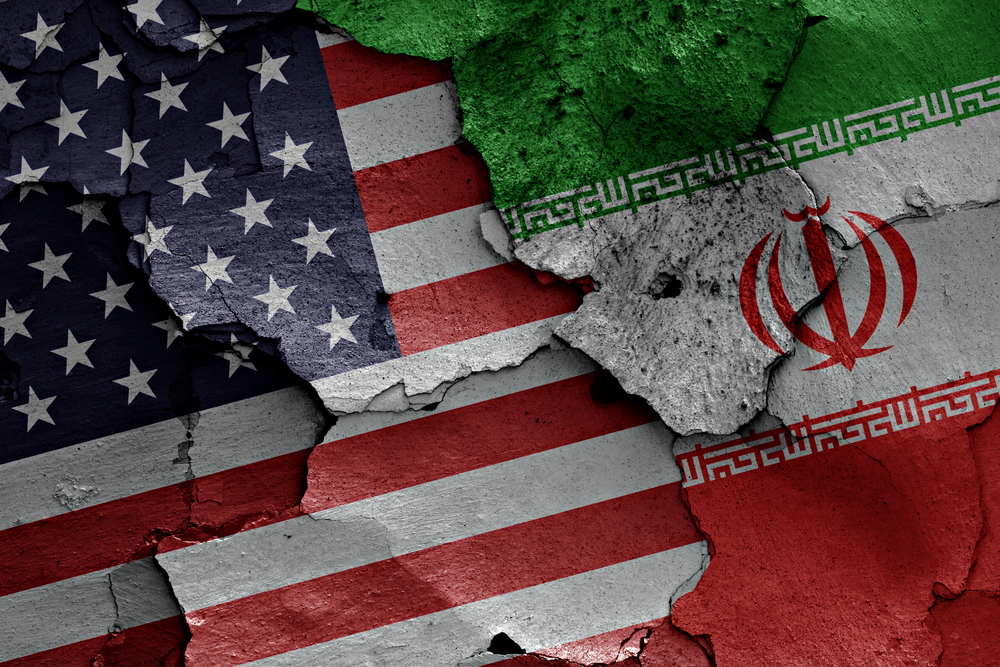
Michael Gordon, Nancy Youssef, and Gordon Lubold for WSJ (“Iranian-Backed Militias Mount New Wave of Attacks as U.S. Supports Israel“):
U.S. Secretary of State Antony Blinken warned Tuesday that Washington would react “swiftly and decisively” if Iran or its proxy forces attack U.S. personnel after Tehran raised the risk of a larger Middle East conflict in recent days by unleashing the regional militias it has spent years arming.
For more than six months, these Iranian-backed militia groups refrained from launching drones or rockets against American troops in Iraq and Syria, as part of what appeared to be an undeclared truce between Tehran and Washington.
That came to an abrupt end when U.S. officials said that Iran-backed groups launched 10 drone and rocket attacks against bases that U.S. troops use in Iraq and another three on a U.S. base in southeast Syria.
The attacks were carried out between Oct. 17 and Oct. 24. In one of the attacks at al-Asad air base in Iraq last week, U.S. troops shot a militia group’s drone out of the sky, where it fell atop of an American drone and destroyed it, U.S. military officials said.
In Yemen, the Iranian-backed Houthis also fired five Iranian-provided cruise missiles and launched about 30 drones toward Israel in an attack that was larger than initially described by the Pentagon, U.S. officials said.
Last week, the USS Carney guided missile destroyer, which was operating in the northern Red Sea, shot down four of the cruise missiles while a fifth cruise missile was intercepted by Saudi Arabia as it protected its airspace, according to people familiar with the episode. Those cruise missiles have a range of more than 2,000 kilometers (about 1,240 miles), the Pentagon said Tuesday, which would enable them to reach targets in Israel.
Amid the surge of attacks on U.S. forces, the Pentagon deployed nearly a dozen air defense systems to countries across the Middle East ahead of Israel’s expected land invasion of Gaza, moving missile launchers to Iraq, Syria and the Gulf, U.S. officials said.
The Pentagon is sending a Terminal High Altitude Area Defense, or Thaad, to Saudi Arabia, and Patriot surface-to-air missile systems to Kuwait, Jordan, Iraq, Saudi Arabia, Qatar and the United Arab Emirates. The systems are expected to be in place later this week, the officials said.
Military bases at al-Udeid in Qatar, Prince Sultan Air Base in Saudi Arabia, and the al-Dhafra base in the United Arab Emirates are all getting air defense systems, military officials said.
The additional forces mark a shift in how the U.S. is deploying in the region. The U.S. had previously sent military assets to deter attacks on Israel from the Lebanese militia Hezbollah, but this week, the U.S. focus is on threats to American troops throughout the Middle East.
“The United States does not seek conflict with Iran; we do not want this war to widen,” Blinken said Tuesday at a tense United Nations meeting. “But if Iran or its proxies attack U.S. personnel anywhere, make no mistake, we will defend our people, we will defend our security, swiftly and decisively.”
[…]
This latest wave of militia attacks comes after Hamas’s Oct. 7 assault on Israel and marks the end of what had been a relatively calm period between Washington and Tehran as the two sides conducted quiet talks over the release of American detainees held in Iran and the pace of Iran’s nuclear program.
More broadly, however, the militia attacks reflect Iran’s longstanding goal of driving American forces out of the Middle East and creating a wedge between Arab states and Washington.
Before the latest flare-up, the last attack was in March when an Iranian supported-militia in Iraq mounted a drone attack on American forces across the border in northeast Syria that killed an American contractor and injured U.S. military and civilian personnel. The Biden administration carried out airstrikes against Iranian-backed militias in Syria in response.
The new spate of militia attacks serves several purposes for Tehran in the view of regional analysts. In the near term, they say, Iran is trying to pressure the U.S. to encourage its Israeli ally to put off its ground incursion in Gaza.
That would help Hamas, which has long benefited from Iranian weapons, training and financial support, and would be a win for “the entire axis of resistance” that Tehran leads, said Kenneth Pollack, a former Central Intelligence Agency analyst who is now at the American Enterprise Institute think tank.
“They want these groups not just to be attacking Israel but to be attacking us to draw a link between us and the Israelis,” he added. “The more that they can do that, the more that they make it difficult for the Arab states, both to reconcile with Israel and continue to maintain these close relationships with us.”
[…]
The U.S. has long and at times bitter experience in confronting Iran-equipped militias. During the U.S. war in Iraq, hundreds of U.S. troops were killed and wounded by Shia militias that were equipped with explosively formed penetrators—a deadly type of roadside bomb supplied by Iran.
In the later campaign against Islamic State, Iran and the U.S. shared a common adversary and refrained from interfering with each other’s military activities in Iraq, though the goal was deconfliction and never cooperation.
After the defeat of Islamic State, the rivalry heated up again. Iran-backed militias attacked U.S. forces in Iraq during the Trump administration, which prompted the U.S. to carry out airstrikes against the Iranian militia Kataib Hezbollah and eventually a drone strike that killed Quds Force commander Qassem Soleimani in 2020.
President Biden’s first use of force as commander in chief was to carry out an airstrike against an Iranian supported group in Syria in response to a rocket attack in northern Iraq against the U.S.-led coalition. But Biden refrained from striking Iranian-backed militias in Iraq, and until last week those groups had been somewhat restrained as well.
While three successive US administrations have been trying to refocus our security strategy on strategic competition with great powers, particularly China, we continually get sucked back into rather fruitless wars in the Middle East. We’re already involved in small-scale kinetic operations all over the region and they appear to be escalating as part of this conflict.
The likelihood that Iranian-backed Hezbollah forces in Lebanon enter the fight is quite high. It would not surprise me in the least if we hit back hard rather than leaving it to Israel.

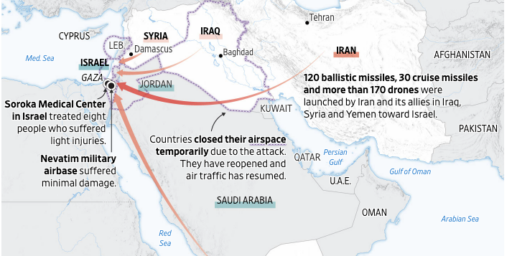
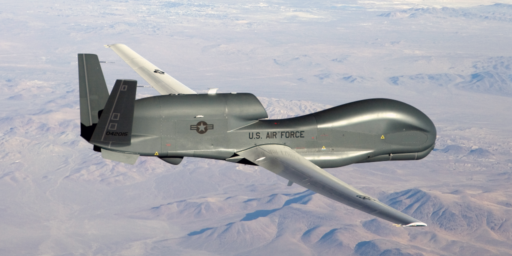

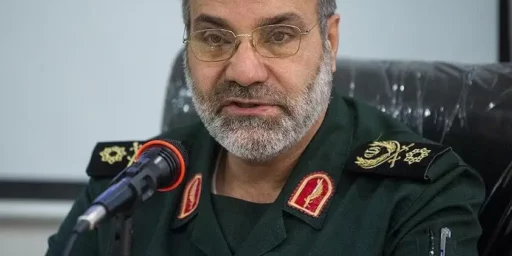
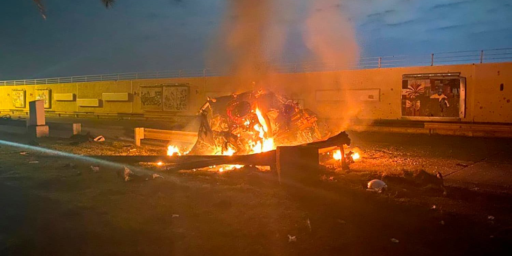
Perhaps you are undervaluing the strategic significance if the region.
And, BTW. Iran is a technologically advanced country with a highly educated population, over twice the population of Ukraine. I don’t know how the size of the Iran economy compares to Russia, but I would not be surprised if it is larger.
@charontwo:
I don’t think anyone’s denying there is strategic significance in the region, just not the significance it had 30 years ago, or even 10. It’s population growth is very weak compared to other regions of emerging economies, the main basis for many ME nations’ wealth is rapidly disappearing as we decarbonize–and that pace is only going to quicken, and the political situation of most governments either fall into “extremely unstable” or “so rigidly stable as to be worrisome.”
In terms of nominal GDP, Iran is in the top 50% of Middle East countries, but not by much.
They are a bit ahead of Iraq, a bit behind Egypt. By comparison, Iran’s economy is about 1/6th the size of Russia’s, 1/3rd the size of Saudi Arabia. (Source: wikipedia, but I compared their nominal GDP numbers with other sights, and found only the smallest of variations.)
I just read that China may also be deploying military assets to the region.
https://www.cf.org/news/china-deploys-six-warships-to-middle-east-us-activates-deployment-of-defence-systems/
I’ve been thinking of resemblances between the Israeli/Palestinian conflict and the British/Irish conflict. Not the twentieth century ones, but the one in 1650. There you have a vastly superior British force go in and take the lands and properties of anyone who wasn’t protestant and English by ancestry, engaging in collective punishment against the towns of those who resisted, executing religious leaders (priests) for the actions of their followers, etc. At the end of it, the British Protestants had complete control and were effectively the only ones allowed to own property, with all lands confiscated from Catholics and the former owners forced to pay rent as tenants at starvation rates. The Irish situation wasn’t resolved in the majority of Irish territory for 275 years, and Catholics weren’t allowed full participation and equal protection under the law in the remaining part for another 50-75 years.
The big difference is that the Irish Catholics didn’t have an equivalent of Iran on their side. And that’s a pretty big difference. What does it mean in terms of speed of resolution given that there are powerful outside interests willing to back the Palestinians?
Note that I’m looking at this as history and am certainly not proposing the Iranians as a force for good. The leadership is downright evil, as is the leadership of Hamas, Hezbollah, etc. But Iran is a force and pretending they are not is useless.
That’s the propaganda but even the US EIA isn’t forecasting a significant decline in the US use of oil. A bit of a dip by 1 MMb/d in 2038 then right back up by 2050. A decline in use for transportation is forecast. Now whether the US can switch from the sour ME variety to the sweet US shale crude is still in the building stage.
@charontwo: I’m not denying that the region has significance. But we’re pouring outsized resources into it compared to the likely benefit, which is nil. More to the point, it’s mostly at odds with our ostensible national security strategy.
And, no, while Russia isn’t the top 7 economy it was just a few years ago, it’s still radically higher in all the major GDP rankings than Iran, which is somewhere between South Africa and Colombia.
The ME remains important in part because of China. We have our own oil and natural gas, China doesn’t. Unless and until they establish more pipelines to Russia our control over the Red Sea and Persian Gulf remains critical to deterring China.
We may be getting to the point where it’s time for a reckoning with Iran. As always, I reject proportional response and prefer overwhelming response – if we get to that point. If we have to engage Iran directly let’s be done with their nuclear program and eliminate their naval and air forces.
@James Joyner:
We’re taking reasonable steps to ensure the security of our many allies in the region as well as our own interests. Deploying Patriot, THAAD, Carrier groups etc. is a normal response to a crisis like this. And it’s intended to prevent the crisis from becoming bigger via deterrence. It’s not a permanent shift in focus that is at odds with our national security strategy. And the benefit is nil? Deterring escalation from other players – especially Iran – is not a nil benefit. Reassuring our regional allies (not just Israel) with the temporary deployment of defensive capabilities like air and missile defenses is not a nil benefit. And it’s not “pouring outsized resources” either since this is crisis response, not a shift in overall resources or strategy.
@Michael Reynolds:
Unless I am as deeply wrong about this as I seem to be about everything else Iranian, Iran is a country with
A) a very unpopular government and
B) an exceptionally patriotic citizenry
which, I do not see as optimum for rushing into a military adventure.
ETA: Consider also the predilection of dictatorships to use foreign enemies for shoring up domestic support.
@Michael Reynolds:
And to that, I’d add Europe, which gets a lot of petroleum from the Middle East. And, of course, petroleum is a global market so a major disruption in the ME due to a big war would affect everyone. And there’s the critical importance of the Suez canal for the US as well as global trade. There is still a civil war in Syria, which borders several allies. Etc. etc.
As much as some want to see the US abandon the region, it can’t.
@charontwo:
We are (or were) on the verge of Arab-Israeli peace and the main thing standing in the way is the Iranian theocracy. I’m not much worried about a rally-round-the-flag reaction in a country whose nuclear program is a series of smoking holes in the ground. What are they going to do that they aren’t already doing?
As long as we don’t bomb Tehran I suspect any rallying effect would be short-lived, while the government would struggle to rebuild what we destroyed.
@Michael Reynolds:
So saith the great authority on Shia Islam and Persian culture.
@charontwo:
What does Shia Islam or Persian culture have to do with eliminating a nuclear program in a terrorist nation? I’m not suggesting we invade or occupy or change the regime or start blowing up mosques. I’m suggesting we eliminate their nuclear program and disarm them. What happens next will be up to the Iranian people.
@Andy: Thus far, there’s little to object to in our response to the Hamas terrorist attacks. I’m referring to the growing possibility of being drawn into a larger war. And the outsized resources we’ve poured in since the ostensible “Pivot/Rebalance to Asia” in 2011, for little gain.
@charontwo:
Canada
Britain
Mexico
Cuba
Philippines
Germany
Italy
Japan
North Korea
Panama
Iraq
Afganistan
Vietnam
A short list, off the top of my head, of countries we’ve warred with that have not come back after us and in many cases became close allies. Even those which remain hostile don’t threaten us. Liberals want to believe that violence, war, never works, which is sweetly optimistic. But the reality is that it works pretty well, which is why people keep doing it.
@Michael Reynolds:
Canada continues to contemplate its long planned and terrible revenge, just you wait and see…
@JohnSF: They are massed at the border, probably waiting for us to lower our guard for an instant.
Unfortunately, to mangle Trotsky:
“You may not be interested in the Middle East, but the Middle East is interested in you.”
@MarkedMan:
-France supporting James II 1688–1691
When the Pope held a Mass of Deliverance celebrating the victory of William III; Catholic solidarity!
– French landings in Ireland 1798 in support of the United Irish rebellion. Which were a catastrophic failure.
Ireland might have done better not to have such an ally at all.
Incidentally, Presbyterians were also banned from holding state offices as well, and excluded from the legal profession and being military officers.
That’s part of the reason why Ulster Presbyterians, and other Protestants like Wolfe Tone were a mainstay of the United Irishmen after 1791. But from 1795 the Ulster Protestants split into loyalists and nationalist, and the active rebels came in the end to be primarily Catholic.
There was (and arguably still is) a cleavage in the Northern Ireland Protestants between hardline “loyalists”/”Orangemen” and the “moderate unionists”.
And the majority of Irish Protestants since the 1600’s were of mixed Scottish/Irish descent, rather than English.
Regarding US forces in the Middle East, my ill-informed guess would be that they will leave Hezbollah to the Israelis.
More likely they are aimed at reminding Assad to keep his head down, for retaliation if attacks are initiated on US forces in Syria and Iraq, and possibly re. the Houthis in Yemen.
And, of course, to deter any direct Iranian actions.
@Michael Reynolds:
Well, there is the wee problem that unprovoked attacks on and within other countries are a tat illegal.
Do you also think we should use the U.S. military to take out the drug cartels in Mexico as the Republicans are advocating? That would be pretty similar from a legalistic POV it seems to me.
Should the U.S. join Russia in cultivating a reputation for illegal aggressions? Why so? To what advantage?
@Michael Reynolds: I’d just like to point out that decades of Israel bombing Palestinians (including several wars) has not actually made the Palestinians back down.
Every example in your list is of the US blowing the shit out of people with their own homeland that they were relatively content with the borders of.
(Except for Cuba, which we didn’t really get involved with past a few half-hearted attempts, and economic sanctions)
Also you forgot Grenada. We haven’t heard shit from Grenada in decades.
Also the Confederate States of America, but that was less successful.
Violence is a tool. Not all tools work in all situations.
England didn’t get peace in North Ireland by bombing the shit out of them.
@Michael Reynolds: ” If we have to engage Iran directly let’s be done with their nuclear program and eliminate their naval and air forces.”
Oh, goody, Michael wants to nuke another few million people. Must be Wednesday.
@wr:
I think Reynolds clearly means destroying Iran’s nuclear program. He does not mention nuking anyone.
I do wonder whether detonating a small yield nuke, say 2-3 kilotons, near a stockpile of bomb materials, would screw up the isotope ratios of the stockpiled uranium and render it useless.
It’s academic, as any large detonation on a stockpile, even a conventional one, would scatter large, small, and microscopic bits of enriched uranium for kilometers around. good luck reassembling them.
I’d be somewhat surprised to see Hizballah act in any meaningful way in this war. They took a hell of a lot of casualties in their war with ISIS fairly recently and Iran has been (by reports I can recall) not been anywhere near as generous or as rich as they once were. The Lebanese economy and government teeters on the brink of bankruptcy. They are in no condition for a fight right now.
I suspect what few actions we have seen on the Lebanese border are from a few hotheads within the ranks. Command and control are not rock solid within the organization, and from Israelis seem to be making pre-emptive strikes to deter notions as much as there have been actions initiated by the Hezzies. I would hope the Iranians are similarly making just a few desultory acts on general principles but have no ambitions of getting in a war right now.
The fundamental problem with bombing Iran’s nuclear program is that you can’t bomb knowledge. And bombing Iran’s program would probably incentivize them to end all IAEA inspections and rebuild the nuclear program covertly to make an actual bomb. Which we would be hard-pressed to prevent since they have the knowledge and understand the engineering enough to rebuild.
That’s what Iraq did after Israel bombed its reactor – they started a covert uranium enrichment program, and it’s also what Iraq planned to continue to do once the sanctions following the first Gulf War ended. But our invasion ended that.
@Andy:
I wonder if they’re really building a bomb.
The original enriched uranium bomb designed at Los Alamos is relatively simple and straightforward. I’m sure any PhD in nuclear physics knows enough to build one.
A modern implosion design is far more complex, and depends as much on precision engineering and manufacturing as it does on physics. It may also be necessary in order to make it small enough to fit on the nose of a missile, or to be carried by an antiquated and poorly maintained American fighter.
The classic Los Alamos design needs to be made mechanically stable, too, and it’s rather inefficient in how it uses fissile material. But it is simple and certain enough, that it wasn’t even tested before deployment. The first uranium bomb was the one used in Hiroshima, not tested beforehand.
Concerns about Iran’s program go back to the W Bush years. That’s going on two decades, and they haven’t managed to test one bomb yet?
@Kathy:
The TLDR version is that Iran very likely had a covert bomb program until about 2003, but not after. The period around 2003 had two important events that changed the strategic situation for Iran:
– The IAEA, aided by various other governments, discovered much of what Iran was up to, including Iranian lies about its declarations to the IAEA. These were material deceptions that, combined with other info, strongly indicated Iran was working on a bomb, though they obviously never admitted it and went to some extreme efforts to hide proof that’s what they were doing.
– We invaded Iraq and deposed Saddam. Contrary to the views held by many in the US, prior to 2003, Iraq was by far the bigger threat to Iran than either the US or Israel. Iran’s nuclear weapon program (and its short-lived chemical weapons program begun during the Iran-Iraq war) was primarily due to the very real threat from Iraq. Once we did Iran’s dirty-work and turned Iraq from an existential hostile power into one that was not a threat, Iran’s strategic calculus changed. They no longer needed a nuclear weapons program to offset the threat from Saddam, so they largely played ball and cooperated.
The same is probably true today, although opinions vary. I personally think it would be difficult for Iran to successfully maintain complete secrecy for a parallel weapon program. In short, Iran probably doesn’t have an active nuclear weapons program, but they are developing the capacity and knowledge to make a weapon on relatively short notice should they need to in the future.
@JohnSF:
Justin Bieber was merely a feint?
@Andy:
@Andy:
Covert uranium enrichment is very difficult to do at scale; and isotopic separation by its nature requires scale.
All the known methods of uranium separation/enrichment require a lot of electricity.
It’s virtually impossible to hide electricity use on that scale.
Even if you bury the power plant, you still need fuel input, water for the turbine cycle etc.
Short of a buried closed-cycle geothermal or nuclear plant, that scale of operation is rather hard to hide.
And also, vulnerable.
Cut the power lines, fuel pipelines, water or combination thereof, and the plant stops working.
Knowledge itself is of little use without the means to employ it.
Which is one reason why the “Iraq covert nukes” hysteria leading up to 2003 was misleading, and probably known to be so by at least some of its promulgators
@JohnSF: True. My ancestors were among them.
@JohnSF:
No one knew about Iraq’s EMIS program until after the 1991 war. And that required huge amounts of power compared to centrifuges. Iraq built that largely from scratch in the decade after Israel’s strike on Tuwaitha in 1981, and they were close to being able to produce the material for a bomb.
Iran’s covert work went undiscovered for years.
So the notion that it’s not possible to hide a covert program – at least for a while, seems contradicted by the historical evidence.
And the point is that programs can be rebuilt if they get bombed. Once a country has the technical knowledge and resources – which Iran has – then you’d need to bomb them again in the future – assuming one knows what and where to bomb.
@Andy:
True; intelligence failure.
But if you look systematically for massive power diversion, or generation, it should be detectable.
I suspect that the effort was not being applied to looking.
A post-strike Iran would be looked at rather harder, one would hope.
Of course, if they were rebuilding, you’d be re-bombing.
All in all, better to avoid the entire scenario.
Especially as being in war mode might be the main hope of the mullah-ocracy/IRG system surviving.
Even if marginally detectable, the end point might be a capability for Iran to produce a single weapon, use it, and face obliteration.
Again, best to avoid.
A lot of this depends upon Iran’s decisions in the next few weeks.